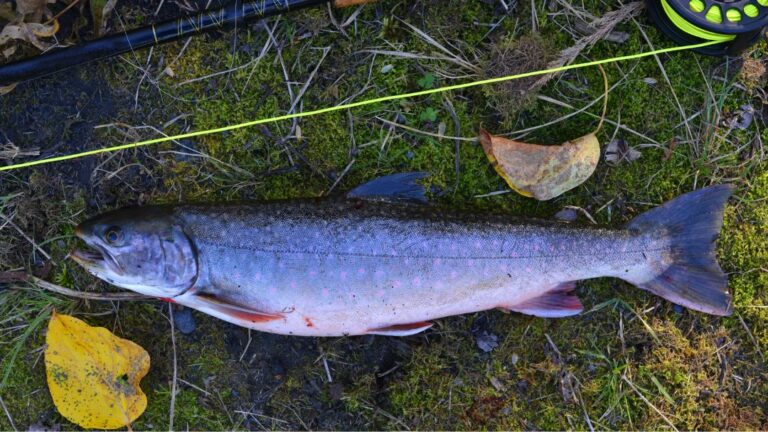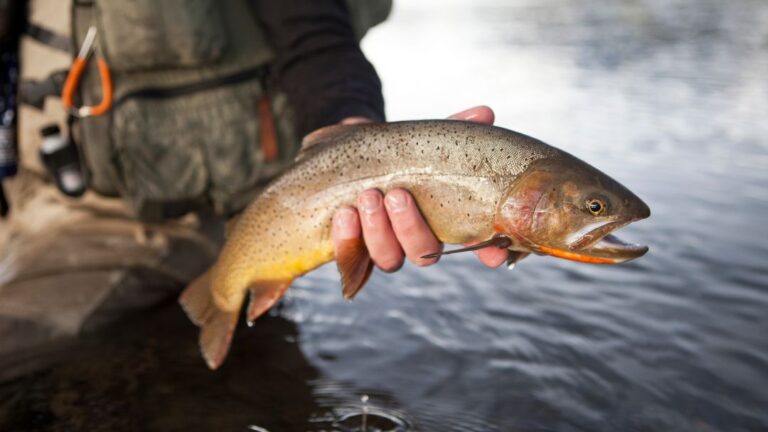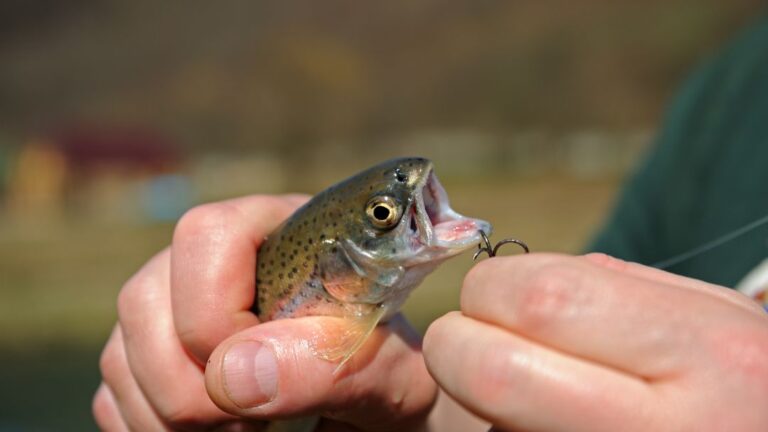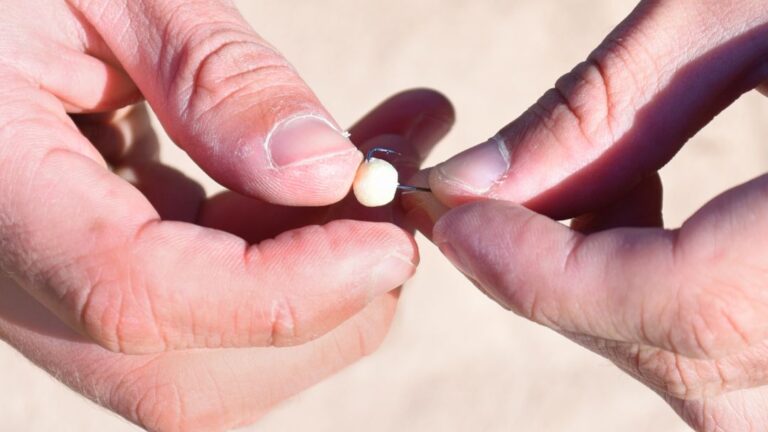Mastering Trout Fishing in New Jersey – Learn from Experts
Tips for trout fishing in New Jersey include choosing the right bait, using proper fishing techniques, and understanding the regulations. With its diverse waterways and abundant trout populations, New Jersey offers an excellent opportunity for trout fishing.
Whether you are a beginner or an experienced angler, following these tips will increase your chances of a successful and enjoyable outing. From selecting the right bait, such as artificial lures or live bait, to mastering casting techniques, knowing the specific regulations for the area you plan to fish, and being aware of the best times to fish, these tips will help you navigate the trout fishing scene in New Jersey with confidence.
The Best Trout Fishing Spots In New Jersey
If you’re an angler looking for the best trout fishing spots in New Jersey, you’re in luck! The Garden State offers a variety of pristine rivers, streams, and lakes that are teeming with trout just waiting to be caught. In this article, we’ll explore the top spots for trout fishing in New Jersey, give an overview of different fishing locations in the state, and discuss the factors you should consider when choosing a fishing spot.
New Jersey is a paradise for trout fishing enthusiasts, and here are some of the top spots you should consider:
| Location | Description |
|---|---|
| South Branch Raritan River | This river is known for its excellent trout population, especially during the spring and fall. |
| Pequest River | The Pequest River offers great fishing opportunities throughout the year, with plenty of stocked trout. |
| Paulinskill River | This river is a favorite among anglers due to its clear waters and abundance of wild and stocked trout. |
| Flatbrook River | Located in the Kittatinny Valley State Park, the Flatbrook River is a prime spot for rainbow and brown trout fishing. |
New Jersey offers a diverse range of fishing locations, ensuring that anglers of all skill levels can find a spot that suits their preferences. Whether you enjoy fishing in rivers, streams, or lakes, there’s something for everyone.
- Rivers: The state boasts several rivers that are perfect for trout fishing. These rivers are known for their pristine waters and abundance of both wild and stocked trout.
- Streams: If you prefer a smaller and more intimate fishing experience, New Jersey’s streams offer a serene setting for trout fishing.
- Lakes: Fishing in lakes can be a rewarding experience, as they often have a high concentration of trout. Some lakes offer boat rentals, allowing you to venture further into the water.
When selecting a fishing spot in New Jersey, there are several factors to keep in mind:
- Accessibility: Consider how easily you can reach the fishing spot. Some areas may require hiking or additional permits.
- Regulations: Familiarize yourself with the fishing regulations in the area, such as catch limits and season dates.
- Water Conditions: Pay attention to the water conditions, such as clarity and flow. Trout prefers colder and clearer water.
- Stocking Schedule: Check the stocking schedule for the fishing spot you’re interested in. Freshly stocked trout are more likely to be caught.
- Local Knowledge: Seek advice from local anglers or fishing shops to learn about the best spots and techniques in the area.
By considering these factors, you can maximize your chances of having a successful and enjoyable trout fishing experience in New Jersey.
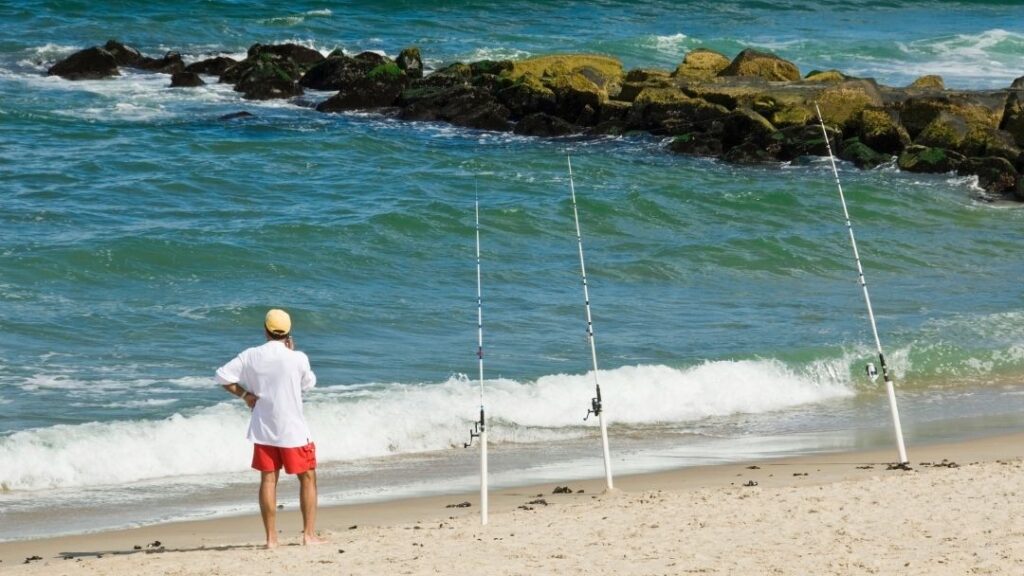
Seasonal Trout Fishing Tips
Trout fishing in New Jersey is a popular activity that offers excitement and relaxation for anglers of all skill levels.
However, the success of your fishing trip can greatly depend on the season and the techniques you use. In this blog post, we will explore some valuable tips and strategies for trout fishing in New Jersey during each season, from spring to winter.
Whether you are a seasoned angler or just starting out, these tips will help you make the most out of your fishing adventures.
Tips For Trout Fishing During Spring In New Jersey
Spring is a wonderful time to go trout fishing in New Jersey as the waters start to warm up, and the trout become more active. Here are some valuable tips to maximize your success during this season:
- Look for areas with fast-flowing water, such as riffles and runs, as trout thrive in oxygen-rich environments.
- Use smaller, lighter bait and lures that imitate natural prey like insects and minnows.
- Target shallow areas near the banks where trout often feed and hide.
- Fish during early morning or late evening when the water temperature is cooler and trout are more active.
- Experiment with different retrieval speeds and techniques, such as twitching or jerking your bait to trigger strikes.
Best Techniques For Trout Fishing In The Summer Months
Summer can present some unique challenges for trout fishing in New Jersey, but with the right techniques, you can still have a successful outing. Consider these tips:
- Focus on early morning or late evening fishing when the water temperatures are cooler and trout are more likely to be active.
- Visit high-elevation lakes or larger rivers where the water may be cooler and more suitable for trout.
- Use light tackle and smaller bait to entice trout in clear, calm waters where they may be more cautious.
- Explore shaded areas, such as under overhanging trees or near rocks, where trout seek refuge from the heat.
- Consider fishing deeper waters where trout may retreat during the warmer parts of the day.
Fall Trout Fishing Strategies In New Jersey
Fall is a fantastic time for trout fishing in New Jersey, as the cooler temperatures and changing foliage create a picturesque backdrop. To enhance your fishing experience, try implementing these strategies:
- Target tributaries and streams that flow into larger rivers, as trout often migrate to these areas for spawning.
- Utilize natural-colored bait and lures that imitate the local forage, such as crayfish or baitfish.
- Cast near fallen trees, submerged logs, and other structures where trout may seek shelter.
- Be mindful of changing weather patterns, as a drop in temperature or an approaching storm can trigger increased trout activity.
- Consider fishing later in the day when the water has had a chance to warm up, as trout may be more active.
Winter Fishing Tips For Catching Trout In New Jersey
When many anglers are packing away their gear for the winter, trout fishing in New Jersey can still be productive if you employ the right strategies. Here are some helpful tips for fishing during the colder months:
- Select slower-moving waters, such as deep pools or slow-moving streams, where trout tend to congregate during winter.
- Use smaller baits and lures that mimic the sluggish movement of winter prey.
- Be patient and allow your bait to float near the bottom, as trout may be less active and prefer an easy meal.
- Dress warmly and be prepared to contend with icy conditions, ensuring your safety while seeking out trout.
- Consider fishing during milder winter days when the water temperature may be slightly higher, increasing trout activity.
Choosing The Right Gear For Trout Fishing
Fishing for trout in New Jersey can be an exciting and rewarding experience. To enhance your chances of success, it’s essential to have the right gear.
In this section, we’ll cover the essential gear you’ll need for successful trout fishing in New Jersey, including choosing the right fishing rod, understanding fishing lines and hooks, and selecting the right bait and lures.
Essential Gear For Successful Trout Fishing
When it comes to trout fishing in New Jersey, having the right gear is crucial. Here are the essential items you should have:
- Fishing rod
- Fishing reel
- Fishing line
- Fishing hooks
- Bait and lures
- Tacklebox
- Fishing net
- Polarized sunglasses
- Waders or waterproof boots
These items will ensure that you are well-equipped for a successful trout fishing experience in New Jersey.
How To Choose The Right Fishing Rod For Fishing In New Jersey
When selecting a fishing rod for trout fishing in New Jersey, there are a few factors to consider. These include:
- Length: A fishing rod between 6 and 8 feet long is ideal for trout fishing.
- Action: Medium to light action rods are suitable for trout fishing.
- Material: Graphite or fiberglass rods are commonly used for trout fishing due to their durability and sensitivity.
- Power: A medium power rod offers the right balance between flexibility and strength for trout fishing.
Considering these factors will help you choose a fishing rod that is well-suited for trout fishing in New Jersey.
Understanding The Importance Of Fishing Lines And Hooks
Fishing lines and hooks play a crucial role in trout fishing success. Here are a few key points to consider:
- Fishing lines: Opt for a monofilament line with a pound test suitable for trout fishing, generally ranging from 4 to 8 pounds.
- Fishing hooks: Size 8 to 12 hooks are appropriate for trout fishing, depending on the type of bait and lures you are using.
Choosing the right fishing lines and hooks will greatly increase your chances of hooking and landing trout in New Jersey.
Selecting The Right Bait And Lures For Trout Fishing In New Jersey
Trout in New Jersey can be enticed by a variety of bait and lures. Here are some popular options:
| Bait | Lures |
|---|---|
| Live worms | Spinners |
| PowerBait | Spoons |
| Salmon Eggs | Soft plastic baits |
| Minnows | Fly fishing flies |
It’s important to experiment with different baits and lures to find what works best for trout fishing in New Jersey.
By carefully selecting the right gear, including fishing rods, lines, hooks, and bait, you can greatly improve your chances of a successful trout fishing trip in New Jersey. Remember to adhere to local regulations and always practice responsible fishing!
Techniques And Strategies For Trout Fishing
Trout fishing in New Jersey is an exhilarating experience for any angler. To make the most of your fishing trips and increase your chances of success, it’s essential to learn and apply the right techniques and strategies. Whether you prefer casting, fly fishing, bank fishing, or kayak fishing, each approach requires specific skills to entice those elusive trout. In this section, we will explore different techniques and strategies for trout fishing in New Jersey, focusing on casting techniques, fly fishing techniques, bank fishing strategies, and tips for kayak fishing.
Casting Techniques For Trout Fishing In New Jersey
Casting is a fundamental skill for any angler and mastering it is crucial for trout fishing in New Jersey. To effectively cast your line and attract trout, follow these techniques:
- Start by choosing the right rod and reel combo for trout fishing. Opt for a lightweight rod with a sensitive tip that allows for accurate and precise casts.
- When casting, it’s important to create a smooth and fluid motion. Practice your casting technique in an open area to improve your accuracy and distance.
- Utilize the “underhand cast” method for short to medium-range casts. This technique involves keeping your rod tip low and close to the water’s surface, using a smooth flick of the wrist to propel the line forward.
- For longer casts, employ the “overhead cast” technique. Raise the rod vertically, allowing the line to unroll behind you before swiftly bringing it forward in a fluid motion, releasing the line at the desired spot.
- Remember to adjust your casting technique based on the prevailing conditions, such as wind direction and overhead obstructions, to prevent tangles and ensure accurate casts.
Fly Fishing Techniques For Catching Trout
Fly fishing is a popular and effective method for catching trout. To increase your chances of success, here are some techniques you can employ:
- Choose the right flies for trout fishing in New Jersey based on the prevailing hatches and conditions. Research local patterns and imitate the insects present in the water.
- Perfect your casting technique for fly fishing. The key is to ensure a delicate presentation by gently laying the fly on the water’s surface.
- Practice the art of “mending” the line. This involves making subtle adjustments to the line’s position, allowing the fly to drift naturally with the current and avoiding drag.
- Experiment with different retrieval techniques, such as the “strip and pause” or “dead-drift” method, to entice trout into striking.
- Always be observant and pay attention to the water’s surface for rising trout. Position yourself strategically and cast your fly accordingly.
Bank Fishing Strategies For Trout Fishing In New Jersey
Bank fishing, or fishing from the shoreline, can be highly productive when targeting trout in New Jersey. Consider these strategies to maximize your success:
- Research and identify productive fishing spots along the river or stream. Look for areas with structure, such as rocks, fallen trees, or undercut banks, where trout are likely to hide.
- Use stealth and approach fishing spots quietly to avoid spooking trout. Stay low, move slowly, and avoid casting shadows on the water.
- Employ the “fan casting” technique, where you cast your line in a fan-shaped pattern, covering a wide area and increasing your chances of attracting a trout.
- Experiment with different bait options, such as live bait, worms, or artificial lures, to determine what works best for the specific trout species in your target area.
- Remember to be patient and persistent when bank fishing. Trout can be selective and cautious, so it may take several attempts to hook a fish.
Tips For Kayak Fishing For Trout In New Jersey
Kayak fishing offers a unique way to access trout-rich waters in New Jersey. Follow these tips to enhance your kayak fishing experience:
- Ensure your kayak is suitable for fishing, with ample storage space for your gear and stability on the water.
- Choose the right location for kayak fishing, considering areas with accessible launch points and good trout populations.
- Invest in a quality fishing rod holder for your kayak to keep your hands free while paddling.
- Experiment with different trolling speeds and depths to find the most productive areas for trout.
- Be aware of water currents and fish-holding structures, such as submerged rocks or weed beds, when determining your fishing spots.
By applying these techniques and strategies, you’ll be well-prepared to enjoy a successful trout fishing adventure in the rivers and streams of New Jersey. Remember, practice makes perfect, so take the time to refine your skills and adapt your approach as needed. Happy fishing!
Conservation And Ethics In Trout Fishing
Trout fishing in New Jersey is not just about the thrill of the catch; it also requires a commitment to conservation and ethical practices. Catch and release is a crucial aspect of preserving trout populations and ensuring sustainable fishing in the state.
When practicing catch and release, it is essential to handle the fish with care to minimize stress and injury. Here are some tips to keep in mind:
1. Use barbless hooks: Barbless hooks are easier to remove, reducing the risk of injury to the fish. They are also beneficial to anglers as they often result in easier hook removal.
2. Minimize handling time: The less time you handle the fish out of water, the better its chances of survival. Ideally, keep the trout in the water while removing the hook and avoid touching its slimy protective coating. Always wet your hands before handling the fish to prevent removing the protective slime layer.
3. Support the fish: If you need to hold the trout, support it gently with both hands, keeping it close to the water. Avoid squeezing or applying excessive pressure, as this can harm the fish’s internal organs.
4. Revive the fish: Before releasing the trout, hold it in the water, gently moving it back and forth to allow water to flow over its gills. This helps the fish recover from the stress of the catch and increases its chances of survival.
Remember, a successful catch and release not only contributes to the conservation of trout populations but also ensures that other anglers get the chance to enjoy the excitement of catching these magnificent fish.
Understanding Fishing Regulations And Limits In The State
To maintain the sustainable trout fishery in New Jersey, it is crucial to have a clear understanding of the fishing regulations and limits set by the state. These regulations are designed to protect the trout population and provide fair fishing opportunities for all anglers.
Here are some key points to keep in mind:
1. Know the seasons and locations: Familiarize yourself with the specific seasons and locations where trout fishing is permitted. Different areas may have different regulations, such as designated trout-stocked waters or special regulations for certain bodies of water.
2. Be aware of size and creel limits: Size limits refer to the minimum length that a trout must meet to be legally kept. Creel limits, on the other hand, restrict the number of trout an angler can keep in a given day or possession. Abiding by these limits ensures that all anglers have the opportunity to catch trout.
3. Stay up to date with changes: Fishing regulations can change from year to year, so it’s important to stay informed. Regularly check the New Jersey Division of Fish and Wildlife website or consult the latest fishing guide for any updates or new regulations.
By understanding and adhering to these fishing regulations and limits, you contribute to the long-term sustainability of the trout population in New Jersey, ensuring a thriving fishery for generations to come.
Promoting Ethical Fishing Practices For Sustainable Trout Fishing In New Jersey
In addition to catch and release practices and following fishing regulations, promoting ethical fishing practices is crucial for sustainable trout fishing in New Jersey. Here are some key principles to keep in mind:
1. Respect the environment: Always leave the fishing area cleaner than you found it. Properly dispose of any trash, fishing line, or other debris to prevent harm to wildlife and their habitats.
2. Respect other anglers: Be mindful of other anglers and their fishing space. Give them ample room and avoid encroaching on their territory. Respect their right to enjoy the fishing experience.
3. Practice proper fish handling: Treat every fish with care and respect, regardless of its size. The well-being of the fish is of utmost importance. Handle them gently, avoid excessive stress, and release them carefully.
4. Share knowledge and educate others: Help spread awareness of ethical fishing practices among fellow anglers. Encourage them to follow catch and release practices, abide by fishing regulations, and respect the environment. By sharing knowledge and educating others, we can all work together to ensure the sustainability of trout fishing in New Jersey.
By adhering to these conservation and ethical principles, we can make a significant difference in preserving the trout population and maintaining a sustainable fishery in New Jersey. Let’s all do our part to ensure the future of this beloved sport.
Conclusion
To wrap up, these tips for trout fishing in New Jersey will undoubtedly enhance your angling adventures. By understanding the best time to fish, selecting the right bait, mastering casting techniques, and choosing suitable fishing spots, you’ll increase your chances of a successful trip.
Remember to check local regulations and respect the environment, ensuring a sustainable and enjoyable experience. So, grab your gear and get ready to explore the abundant trout fishing opportunities that New Jersey has to offer!

